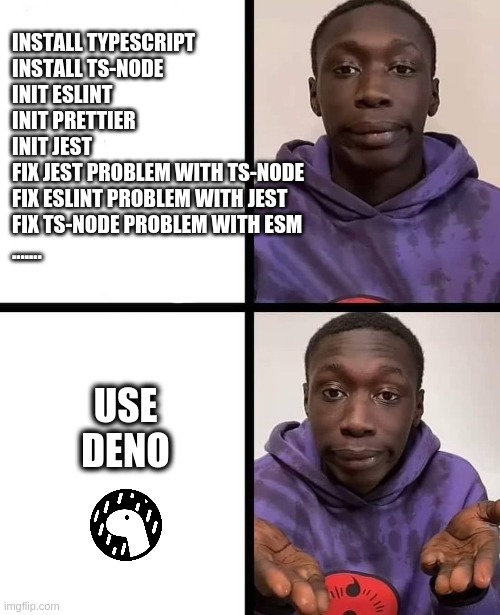deno.land / x / deno2node@v1.6.0
deno2node
tsc replacement for transpiling Deno libraries to run on Node.js.
Essentially a thin wrapper around tsc to work on Deno code.
Quick Setup
If you don't already have a
package.json, you may finddnteasier to use.
Run npx deno2node --init in an empty directory.
CLI Usage From Node.js
First, install deno2node.
npm install --save-dev deno2nodeNext, run it with npx:
npx deno2nodeIt is useful to put deno2node in a prepare script. You can configure this by
running the following command.
npm set-script prepare deno2nodeYou can now simply run
npm run prepareto run deno2node. In addition, this will be executed automatically when you
run npm install.
CLI Usage From Deno
deno2node is actually a Deno project that compiles itself to run on Node.js.
(This is a great way to test the tool, too.)
deno run --no-prompt --allow-read=. --allow-write=. \
https://deno.land/x/deno2node/src/cli.tsHow It Works
There are three main steps to this.
- Transform the code base in-memory, by rewriting all import statements.
- Typecheck the code.
- Emit
.jsand.d.tsfiles. These files can directly be run by Node or published on npm.
deno2node uses ts-morph under the hood, which in turn builds on top of the
TypeScript compiler tsc. Hence, you get the same behaviour as if you had
developed your code directly for Node.
deno2node can perform more powerful transpilation steps that make it flexible
enough for most needs.
Shimming
Some things are global in Deno, but not in Node.js. One example for this is
fetch. Consequently, you need to shim them, i.e. provide code that
supplements the missing globals.
Note that
deno2nodedoes not actually touch global definitions. Instead, it only injects import statements in the respective modules.
Install the packages providing the shims.
Now, create a file that exports the globals you need:
// @filename: src/shim.node.ts
export { Blob } from "buffer";
export { webcrypto as crypto } from "crypto";
export { fetch, File, FormData, Headers, Request, Response } from "undici";
export { Deno } from "@deno/shim-deno";
export { alert, confirm, prompt } from "@deno/shim-prompts";Lastly, you need to register your shims in tsconfig.json so deno2node can
inject them for you:
// @filename: tsconfig.json
{
"deno2node": {
"shim": "src/shim.node.ts" // path to shim file, relative to tsconfig
}
}Runtime-specific code
In same cases you may want to have two different implementations, depending on
whether you're running on Deno or on Node. When shimming is not enough, you can
provide a Node-specific <anything>.node.ts and a Deno-specific
<anything>.deno.ts version of any file. They need to reside next to each other
in the same directory.
deno2node will ignore the Deno version and rewrite imports to use the Node.js
version instead. Thus, the Deno-specific file will not be part of the build
output.
For example, provide greet.deno.ts for Deno:
// @filename: src/greet.deno.ts
export function greet() {
console.log("Hello Deno!");
// access Deno-specific APIs here
}Now, provide greet.node.ts for Node:
// @filename: src/greet.node.ts
export function greet() {
console.log("Hello Node!");
// access Node-specific APIs here
}Finally, use it in foo.ts:
import { greet } from "./platform.deno.ts";
// Prints "Hello Deno!" on Deno,
// and "Hello Node!" on Node:
greet();This technique has many uses. deno2node itself uses it to import from
https://deno.land/x. The Telegram bot framework grammY uses it to abstract
away platform-specific APIs.
Vendoring
To import a module which has no npm equivalent, first set up vendorDir.
// @filename: tsconfig.json
{
"deno2node": {
"vendorDir": "src/vendor/" // path within `rootDir`
}
}Then, populate it: deno vendor src/deps.vendor.ts --output src/vendor/.
Vendoring is still experimental, so be welcome to open an issue if you encounter a problem with it!
Also, consider recommending pnpm to users of your library. It might be able
to deduplicate vendored files across packages.
API
Confer the automatically generated API Reference if you want to use
deno2node from code.
Versioning
Similar to tsc, new features or TypeScript upgrades may alter output or
diagnostics of the CLI across minor versions. While this usually does not break
anything, you may still want to pin the minor version, hence only allowing patch
updates. You can do this by adding a ~ prefix to the version in your
package.json file.
npm install --save-dev --save-prefix='~' deno2nodeVersion Info





